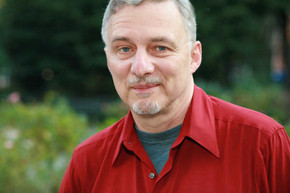The eight years I have now written for Skope has afforded me the opportunity to access a myriad of musical styles and the artists within them. I spoke to Eminem collaborator, Proof a few years before he was gunned down in a Detroit nightclub; I got to speak to the usually elusive Evan Dando after he reignited The Lemonheads and at one point I had Pennywise guitarist, Fletcher Dragge’s home phone number. I have covered enormous bands out of the Warner Brothers’ camp as well as unsigned weekend warrior songwriters that play small coffee shops in their hometowns. I think a part of me was convinced that I had seen it all.
Then I was assigned a feature on a gentleman named Hudson Owen and I quickly learned I was wrong; in that I have never seen anything like this before.
Much of what I was able to find out about Owen was gleaned from a brief email interview, his personal blog and a short bio on the Jango website. What I have been able to find out is that he is a bit of a renaissance man. Well read and incredibly intelligent, his frequent blog posts range from commentary on pop culture (Charlie Sheen’s televised breakdown), reflections on 9/11 (he is a Brooklynite) to emerging technology (Kindles and eBooks).
“I was born in Buffalo New York, where they build great snowmen,” Owen said. “I grew up in Wilmington, Delaware, headquarters for the DuPont Company. My Dad worked for DuPont. I’ve traveled fairly widely. Brooklyn, self-proclaimed Art Capital of the World, has been my home for a number of years.”
Always musically inclined, Owen sang in a choir as a child and played saxophone in his teen years and later in life he penned the songs and lyrics for his own musical “Paris — A Musical of the 1920s.” “Music has always been a part of my life,” he said. “But my first efforts were as a writer. I knew I wanted to be a writer at an early age, no specific time and place. It was something people said I was good at. I had the idea of combining music and poetry at an early age. It took me a really long time to actually start doing that, to start writing songs.”
One could venture to guess his attraction to writing laid the foundation for his newfound venture of writing songs, though not “songs” in the traditional sense of the word.
Though there is no album per se, the songs exist as a small collection of singles. They are one part spoken word, another part storytelling with a mix of backing sound effects and/or snippets of accompanying music. “Lately, I have been writing songs. Some are regular songs with a melody, while others combine vocals, music and sound effects. You might think of them as story songs or ballads, or ‘spoke songs’–my term. I cook them up in a recording studio in Manhattan,” Owen said of his “songwriting” style. When asked what inspired him to write he replied: “Oh, that could be most anything. A story, something I read, a phone call. Stuff is going on in my head all the time. It gets quite noisy in there.”
“I guess I start with the words,” he continued. “I go into the recording studio with the text which I have become familiar with. I record the text, then go into the interior studio with the engineer and keyboard artist and work out the song with them, going through dozens of music loops and sound effects, trying this and that, building up the song that way. It usually takes about four hours to cook up a song. It’s fun, but quite tiring.”
The first “enigma wrapped in a mystery adorned with a puzzle” of the songs has to be the quirky “Work Day Song” which tracks the hours of a typical workday through sound effects ranging from the opening morning rooster call through the clacks of a typewriter, phone conversations and co-workers greetings laid over Owen’s drone “’dah dah dum’ foundation melody.” The politically charged “I’m Going To Save America” plays out like a traditional song with verses and chorus. The verses of the “song” in poem form a filled with the typical rhetoric of campaigning candidates while the sing-songy chorus repeats the track title. “Ballad of the Diamond Ditch Saloon” is a sort of spoken word version of the Beatles “Rocky Raccoon” complete with Western setting, a good guy versus bad guy ethos and their eventual standoff. It is just over 9:30 of clever words, a simple rhyme scheme and anecdotal “lyrics.”
Owen is focusing on selling more single downloads to eventually cut a record. After the album, he admitted he would be open to label involvement and beyond that “I also write lyrics for singers–if I can just find a reliable singer in New York. These lyrics are for sophisticated club type of songs that could be sung live, recorded and promoted through the regular channels. If I can find a singer, I’ll move forward with that. It’s a better business model. The music biz, as you know, is built around the singer-songwriter and the band. I may not need a band, but I sure could use a good singer.”
By Chris West – cwest@skopemagazine.com


